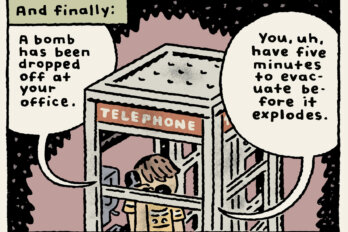Early on in Ian Williams’s Reproduction, readers are treated to one of the novel’s many sex talks. The conversation, though, looks nothing like the classic childhood chat.
I don’t want to get pregnant.
Then don’t.
That’s the extent of the wisdom Edgar, the middle-aged heir of a moneyed German family, offers to Felicia, a teenage girl from an undisclosed Caribbean island. The two meet in the 1970s in a Toronto hospital room where both of their mothers lie near death. Edgar’s “Mutter” pulls through; Felicia’s doesn’t.
Felicia, alone and adrift in a new country, moves in with Edgar to act as his mother’s caretaker. As the weeks pass, their arrangement slides into a volatile intimacy. The earlier sex talk notwithstanding, Felicia gets pregnant and, knowing their relationship is unhealthy, leaves to raise the child alone. She names her son Armistice—Army for short—after a word Edgar hurled in vain in the leadup to her departure.
The story then follows mother and son over the decades as they make a life together in Brampton, Ontario, attracting errant connections that form into a chosen family. The growing circle includes Oliver, their lonely divorced landlord, and his precocious teenage daughter, Heather. Edgar keeps trying to worm his way back into Felicia’s life while she is at pains to keep his identity a secret from her son. All Army knows about his patrilineal roots is something Felicia once let slip during his ceaseless questioning—that his absent father is extremely wealthy. It’s a detail that proves seductive, and from his teen years onward, Army is devoted to his goal of getting rich quick.
As time passes, history seems to repeat itself: Heather unexpectedly gets pregnant, and Felicia adopts the child, who is named Chariot (Riot for short). Riot also gets a version of his past that is missing pieces—instead of the truth, he is told that his birth mother is a famous film actress who put him up for adoption in order to maintain her career.
Reproduction delights in the accidental chaos of connection and the breaking and remaking of familial bonds. The sex-talk motif is just one part of Williams’s keen attention to the ways a person’s origins inform who they become. Just as Army single-mindedly pursues the wealth he believes is his birthright, Riot internalizes the myth about his mother and decides to become a filmmaker. Neither mission ends well. Throughout the novel, Williams, a poet and a professor of creative writing at the University of British Columbia, wrestles with two questions: Are people doomed to replicate the quirks in their DNA? And what are the consequences of getting attached to a version of history that is not technically true?
The difficulty of reconstructing one’s origin story has been a long-time concern of Black writers both in Canada and abroad. How does one best represent selfhood and home, especially if what was once “home” is now elsewhere and the new terrain is hostile? Austin Clarke’s acclaimed Toronto trilogy addressed these questions starting in the 1960s, staging the uneasy coexistence between newly arrived West Indian domestics and a white population that embraced multiculturalism in name alone. Dionne Brand has explored questions of displacement in much of her work over the last few decades, perhaps most powerfully in 2001’s A Map to the Door of No Return, a poetic, genre-crossing memoir that examines the legacy of the transatlantic slave trade and the “rupture of geography” that stole an entire people’s traceable beginnings.
Williams’s book aims to grow upon this rich tradition of the origin story, and it’s a project he’s not undertaking alone. Reproduction appeared on shelves less than a month before André Alexis’s new novel, Days by Moonlight. Both books tell stories of Black Canadians building lives in a country committed to the veneer of multicultural tolerance: Williams by charting the tumult of family history; Alexis with an uncanny road trip through small-town traditions. These books unearth tales that are often left untold to show that, like the family tree in Reproduction, the story of Canada hides some rot in its roots.
Williams is the author of two collections of poetry, including 2012’s Griffin-shortlisted Personals, and a book of short stories. Reproduction, his first novel, is the recognizable child of these predecessors, sharing their interest in questions about identity and a poet’s fine-grained attention to form.
The challenge of tracing one’s personal history is inscribed into the novel’s genetic code. Its opening sentences stutter with the trouble of settling on a story’s starting point as they try to describe Felicia’s mother’s death: “Before she died her mother was prickly. Before her mother died she was. One more time. Before her mother died she, her mother, was prickly. One more time. Before her mother died she, her mother, prickled her, Felicia.” From the start, readers see this inherent struggle to find a point of origin—the final version of the sentence is the most ungainly, but it is also the most accurate.
Reproduction is rife with these kinds of tiny, intentional mishaps and imperfect repetitions. Some are close to the surface, including Army’s unconscious mirroring of the way Edgar crosses his forearms to grip his own wrists; others point to deeper currents, such as Army’s pursuit of wealth or Oliver’s son play-acting, with chilling specificity, the “divorce game.” Through such echoes, Williams probes the ways that history carries the risk of perpetuating past wrongs. Take Felicia and Edgar’s entanglement: old white colonial Europe collides with a different culture and can’t suppress its urge to dominate. We’ve seen this story before. Though Williams mines the couple’s mismatch for comedy at first, the power imbalances of race and class culminate in exploitation. Similarly, when Edgar re-enters Felicia’s life years later, he’s facing workplace allegations of sexual misconduct—a pattern of behaviour that arguably started with Felicia and never truly stopped.
The novel takes its structure from the process of cell division, mirroring the course of procreation. Part one trades in alternating chapters—“XX” to denote Felicia’s point of view and “XY” for Edgar’s—and relays the interwoven strands of their courtship. Subsequent sections keep splitting the cell: the second part unfolds in sixteen chapters told by four characters—Felicia, Army, Oliver, and Heather—while the third fragments into 256 microchapters told by a broader range of voices that orbit this immediate circle. By the fourth and final part of Reproduction, Edgar is back in Felicia’s life and undergoing cancer treatments as the now adult Army eagerly awaits his inheritance, and the language itself starts to metastasize: the flow of narration becomes interrupted with the fragmentary thoughts of outside characters. The result is a novel that teems with the riot of life, but it’s a chaos that is anchored by deliberate formal control.
Despite its thematic savvy, the structure of Reproduction is sometimes less effective in sustaining the pleasurable build of plot and character. One sometimes feels shortchanged by the jolt of the later sections, which cycle through perspectives as quickly as cue cards. Still, Williams has an ear for comic dialogue, and it doesn’t take him many words to convey the core of a character. Take the interstitial chapters that appear between the larger sections, presented as a series of snappy conversations all titled, fittingly, “The Sex Talk.” In one memorable phone call between Edgar and a teen Army—who is now aware of Edgar’s identity as his father—the enterprising son tries to sell his dad a haircut, having set up a barbershop in Oliver’s garage:
You want a cut?
Of?
A haircut. Best in Brampton. It’s 55 Newcourt. Come through.
I’ll come true.
Not even two dozen words are used to deftly signal Army’s posturing and Edgar’s old-white-male mix of cluelessness and confidence—there’s something of a familial resemblance to this. The conversation even ends with a small unfaithful reproduction. It feels almost like poetry.
The questions that Reproduction ask about how we tell the story of our lives are similar to the one worth asking of our country. This is the challenge André Alexis puts to the Canadian novel in Days by Moonlight, a book preoccupied with reproduction of a different kind. Alexis draws on the narratives of our national literature so well worn they’ve passed almost invisibly into a standard: whiteness, parochialism, insularity.
The fourth book in a planned five-novel cycle, Days by Moonlight masquerades as one of those pure Canadiana texts that a high schooler might complain about having been assigned: a young botanist, Alfred Homer, recently single and processing the anniversary of his parents’ death, takes a road trip through southern Ontario with an academic, Professor Bruno, who’s studying a reclusive poet. At least at the start, the plot tracks very closely to the myths of the old guard—two middle-class men, presumably white, are embarking on a quest for knowledge that entails reconnecting with their charming homeland. But the sweetness found in the novel’s small towns is an illusion and serves as a counterpoint to the scenes of racist and colonial brutality that emerge as the pair’s trip veers into fantastical cruelty.
Each locale that Alfred and Bruno visit partakes in a strange practice that makes sport of one of its marginalized communities. While passing through Nobleton, for example, Alfie watches in horror as the town stages its annual housing raffle. Low-income families are invited to enter for the chance to win a year’s worth of free housing. The catch is that once that time is up, the winners’ house is set afire and the family must race to put out the flames before all is lost. Nobleton’s residents consider the tradition an act of charity, and when faced with criticism, they console themselves with the thought that “at least it’s not as stupid as Coulson’s Hill’s Indigenous Parade.” (In that festivity, a handful of people dress as the Canadian fathers of Confederation and parade through the town on flatbed trucks. The remaining white townsfolk, dressed in what they believe to be the traditional clothing of Indigenous peoples, take to the streets to throw rotten fruit at the historical figures. This parade, the brainchild of an ignorant committee, is meant to serve as a form of restitution for settler colonialism.)
As in Williams’s novel, Alexis’s trip through Canada’s psyche probes questions of genealogy, albeit of a more explicitly literary kind. Small towns and morality tales loom large in our national literature—writers like Robertson Davies and L. M. Montgomery—and if Canadians truly consider these genteel scenes part of our self-image, then we’re also obliged to see what else lies below their surface. In Nobleton, locals go out of their way to offer Alfred and Professor Bruno hospitality and helpful research tidbits; a dozen pages later, the same townspeople are gleefully watching houses burn. The people of Coulson’s Hill “sometimes noticed that the Indigenous populations of Canada had been mistreated” and, in their tasteless zeal, wanted to redress past wrongs; their meaningless acknowledgement is impossible to separate from their underlying ignorance. In his afterword, Alexis writes that the novel is “not a work that uses the imagination to show the real, but one that uses the real to show the imagination.”
Both Alexis and Williams are attuned to how ostensibly minor actions can turn destructive through repetition. Today’s glib references to an “appropriation prize”—a real 2017 example that saw a group of white editors offer funds for a contest wherein writers would compete to imitate the voices of minorities, while Indigenous and racialized writers called out the ongoing absence of diversity in newsrooms and publishing houses—becomes tomorrow’s town parade.
Days by Moonlight and Reproduction offer a new perspective on origin stories and show that while histories have the power to shape our lives, they can also derail them. Williams reminds us of this at the end of Reproduction, when he offers up what could be called the novel’s last sex talk. This one is delivered to Army, as the hopeful son meets with a lawyer to learn news of his inheritance. It should be no surprise that the answer is disappointing: “You were probably expecting more.”





